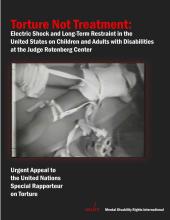Video Testimony before the Inter-American Commission on Torture in Mexico's Institutions:
Disability Rights International (DRI) and a coalition of partners from Mexico testified before the Inter-American Commission on Human Rights (IACHR) at a public hearing on Friday, March 23, 2012. DRI's findings in Mexico are "deeply disturbing" said DRI Executive Director Eric Rosenthal, J.D., "and the Mexican government must be pressured to protect its most vulnerable citizens - those locked away for a lifetime because they have a disability - living in orphanages, psychiatric institutions and other social care facilities."


